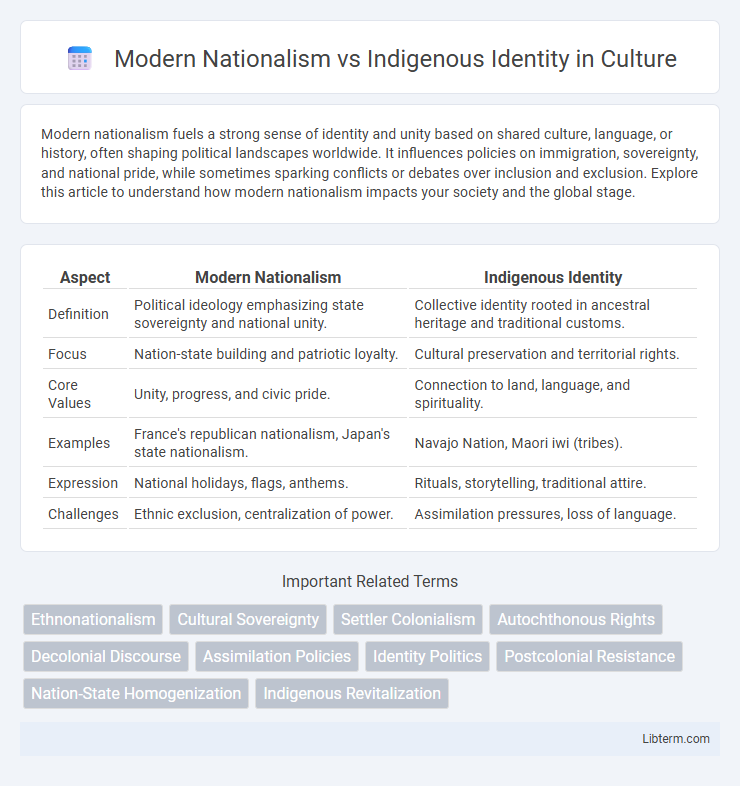Modern nationalism fuels a strong sense of identity and unity based on shared culture, language, or history, often shaping political landscapes worldwide. It influences policies on immigration, sovereignty, and national pride, while sometimes sparking conflicts or debates over inclusion and exclusion. Explore this article to understand how modern nationalism impacts your society and the global stage.
Table of Comparison
| Aspect | Modern Nationalism | Indigenous Identity |
|---|---|---|
| Definition | Political ideology emphasizing state sovereignty and national unity. | Collective identity rooted in ancestral heritage and traditional customs. |
| Focus | Nation-state building and patriotic loyalty. | Cultural preservation and territorial rights. |
| Core Values | Unity, progress, and civic pride. | Connection to land, language, and spirituality. |
| Examples | France's republican nationalism, Japan's state nationalism. | Navajo Nation, Maori iwi (tribes). |
| Expression | National holidays, flags, anthems. | Rituals, storytelling, traditional attire. |
| Challenges | Ethnic exclusion, centralization of power. | Assimilation pressures, loss of language. |
Defining Modern Nationalism and Indigenous Identity
Modern nationalism emphasizes the creation of unified nation-states based on shared language, culture, and political sovereignty, often driven by centralized governance and civic identity. Indigenous identity centers on ancestral ties to specific lands, distinct cultural practices, and community-led governance systems that predate modern state boundaries. The tension between modern nationalism and Indigenous identity arises from differing conceptions of belonging, sovereignty, and cultural preservation.
Historical Context of Nationalism and Indigenous Struggles
Modern nationalism emerged in the 18th and 19th centuries as a political ideology emphasizing the sovereignty of nation-states and the unity of people based on shared culture, language, and history. Indigenous identity, rooted in ancestral lands, traditions, and self-governance, often faced marginalization within the frameworks of newly formed nation-states. The historical context of nationalism frequently led to conflicts and struggles for Indigenous peoples seeking recognition, land rights, and preservation of cultural heritage amid dominant national narratives.
The Evolution of Indigenous Identity in Nation-States
The evolution of Indigenous identity within nation-states reflects a dynamic interplay between traditional cultural values and modern political frameworks, emphasizing self-determination and cultural preservation. Indigenous groups increasingly assert sovereignty and rights through legal recognition, international declarations like the UNDRIP, and revitalization of languages and customs. This transformation challenges homogenizing modern nationalism by promoting pluralistic national identities that integrate Indigenous heritage and contemporary statehood.
Nationalist Policies and Their Impact on Indigenous Communities
Modern nationalist policies often prioritize state unity and cultural homogeneity, which can lead to the marginalization of indigenous identities and traditions. These policies frequently result in land dispossession, restricted access to resources, and the erosion of indigenous languages and customs. The impact on indigenous communities includes social exclusion, loss of sovereignty, and challenges to the preservation of their cultural heritage.
Cultural Preservation vs National Assimilation
Modern nationalism often emphasizes national assimilation, promoting a unified identity that can overshadow Indigenous cultural practices and languages. Indigenous identity prioritizes cultural preservation, safeguarding traditional customs, beliefs, and languages from dilution or loss within broader national frameworks. This tension highlights the challenge of balancing state-building efforts with the protection of diverse Indigenous heritage and autonomy.
Political Representation of Indigenous Peoples
Political representation of Indigenous peoples remains a critical issue in the context of modern nationalism, where state-centric agendas often overshadow Indigenous sovereignty and distinct cultural identities. Despite increased advocacy and international frameworks like the UN Declaration on the Rights of Indigenous Peoples, many Indigenous communities struggle to achieve meaningful participation and voice in national legislatures. Effective political representation requires tailored policies that recognize traditional governance structures and integrate Indigenous perspectives into decision-making processes at all government levels.
Economic Disparities and Land Rights
Modern nationalism often overlooks indigenous identity by prioritizing state-driven economic development that marginalizes indigenous land rights and exacerbates economic disparities. Indigenous communities frequently face displacement and limited access to natural resources, undermining their traditional economies and cultural preservation. Protecting indigenous land rights is essential for addressing economic inequalities and ensuring sustainable development aligned with indigenous self-determination.
Language Revitalization Amid Nationalist Agendas
Language revitalization plays a critical role in preserving indigenous identity amid modern nationalist agendas that often prioritize a unified national language to solidify state cohesion. Efforts to revive indigenous languages, such as Maori in New Zealand or Quechua in Peru, challenge dominant narratives by reinforcing cultural heritage and distinct community ties. Government policies and grassroots movements must balance the promotion of national unity with the protection of linguistic diversity to ensure indigenous voices remain vibrant and respected.
Case Studies: Indigenous Movements in Modern Nations
Indigenous movements in modern nations like the Zapatistas in Mexico and the Sami in Scandinavia highlight conflicts between state-driven nationalism and indigenous identity preservation. These movements emphasize land rights, cultural autonomy, and political representation amid national policies promoting assimilation and economic development. Their resistance reveals how indigenous identity challenges dominant narratives while demanding recognition within modern nation-states' political frameworks.
Toward Reconciliation: Bridging Nationalism and Indigenous Rights
Modern nationalism often emphasizes state sovereignty and unified national identity, which can overshadow Indigenous rights and cultural distinctiveness. Toward reconciliation, efforts must prioritize recognizing Indigenous sovereignty and integrating Indigenous perspectives into national narratives to bridge these divides. Policies promoting land rights, cultural preservation, and political representation serve as key mechanisms for aligning modern nationalism with Indigenous identity.
Modern Nationalism Infographic

 libterm.com
libterm.com